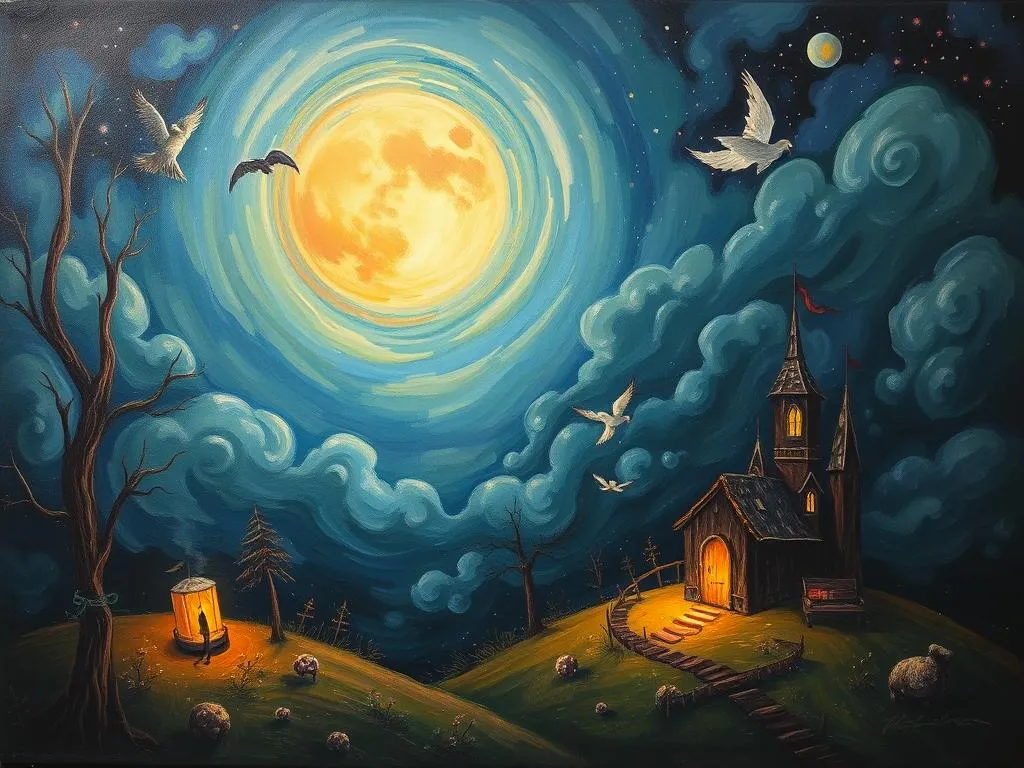
Dreams have always fascinated humanity, serving as a gateway to understanding our subconscious thoughts, emotions, and fears. Among the myriad of dream themes, darkness stands out as a powerful symbol that evokes both fear and curiosity. For many, encountering darkness in dreams can be unsettling, leading to a myriad of interpretations and reflections. The relevance of darkness in dreams invites us to delve deeper into our psyche, revealing hidden aspects of our lives and emotions. This exploration of darkness can illuminate our personal journeys, shedding light on the shadows we often overlook.
Symbolism and Meaning
Darkness in dreams is rich with symbolism, often representing the unknown or repressed aspects of our psyche. It can signify fear, confusion, or even the unconscious mind itself. When we dream of darkness, we may be confronting elements of our lives that we are not fully aware of or are reluctant to acknowledge.
From a psychological perspective, darkness can signify anxiety or unresolved issues that linger in our waking life. It may represent feelings of isolation, uncertainty, or despair—emotions we may not fully express during our conscious hours. In this sense, dreaming of darkness becomes a mirror reflecting our inner state, prompting us to confront these feelings head-on.
On the other hand, darkness can also symbolize potential and transformation. Just as night transitions into day, darkness can herald new beginnings and opportunities for growth. It can represent the fertile ground in which new ideas and experiences can emerge, suggesting that embracing the unknown can lead to profound personal transformation. Here, darkness serves as a canvas, inviting us to paint our lives with more vibrant colors.
Cultural interpretations of darkness further enrich its symbolism. In some cultures, darkness is associated with mystery and spirituality, representing a connection to the divine or the unseen forces that guide our lives. In others, it may signify danger or evil, urging caution and vigilance. The multifaceted nature of darkness in dreams encourages us to explore our personal beliefs and experiences, ultimately allowing for a deeper understanding of its significance in our lives.
Key Scenarios and Variations
The context of darkness in dreams can greatly affect its interpretation. For instance, dreaming of walking in a dark forest may evoke feelings of fear and uncertainty, suggesting that the dreamer is navigating through a challenging period in their life. In this scenario, the darkness represents obstacles or fears that need to be confronted. Alternatively, if one dreams of being enveloped in darkness but feels a sense of calm or safety, it may indicate acceptance of the unknown and a readiness to embrace change.
Another common scenario is being chased in the dark. This dream often signifies a struggle with anxiety or unresolved issues that the dreamer is trying to escape. The pursuer might represent a fear or obligation that the dreamer has been avoiding. In this case, the darkness amplifies the sense of urgency and fear, prompting a need for resolution or confrontation.
Conversely, dreaming of finding light in darkness can symbolize hope and resilience. When a dreamer discovers a source of light amidst the shadows, it may indicate a breakthrough or newfound clarity in a challenging situation. This scenario invites reflection on how one can harness inner strength to overcome difficulties and find guidance.
The setting of the dream also plays a crucial role in its interpretation. For example, darkness in a familiar setting, like one’s home, can evoke feelings of safety mixed with uncertainty, suggesting that the dreamer may be facing internal conflicts or changes in their personal life. In contrast, darkness in an unfamiliar environment could indicate feelings of being lost or overwhelmed in one’s waking life, urging the dreamer to seek direction and clarity.
Personal experiences significantly influence how darkness manifests in dreams. A person who has recently experienced loss may dream of darkness as an expression of grief and longing. In contrast, someone undergoing a significant life transition may interpret darkness as a necessary phase of transformation. Each scenario invites the dreamer to explore their feelings and experiences, leading to a more nuanced understanding of the dream’s significance.
Real-Life Connections and Takeaways
Reflecting on dreams of darkness can provide valuable insights into our waking lives. These dreams often serve as a reminder to confront our fears and insecurities rather than avoid them. By acknowledging the darkness within us, we can begin to understand the underlying issues that may be affecting our emotional well-being.
One practical approach to connecting these dreams to real life is through self-reflection. Keeping a dream journal can help track recurring themes and emotions associated with dreams of darkness. By writing down these dreams, individuals can gain clarity on their feelings and the possible triggers in their waking life. This practice encourages introspection and may lead to revelations about personal challenges or unaddressed emotions.
Another important takeaway is the value of embracing uncertainty. Rather than viewing darkness solely as a negative force, it can be reframed as an opportunity for growth and exploration. Engaging with the unknown allows for personal development and the potential for new experiences. This perspective shift can empower individuals to approach life’s challenges with curiosity rather than fear.
It’s also essential to consider the role of support systems in navigating darkness. Sharing dreams and feelings with trusted friends or mental health professionals can facilitate deeper understanding and healing. By discussing the emotions tied to dreams of darkness, individuals can gain different perspectives and insights, fostering a sense of community and connection.
Finally, individuals can explore creative outlets as a means of processing their feelings related to darkness. Art, writing, or other forms of self-expression can serve as powerful tools for understanding and confronting the emotions tied to these dreams. By channeling fears and uncertainties into creative endeavors, individuals can find meaning and clarity, allowing the darkness to transform into a source of inspiration.
As you reflect on your own experiences with darkness in dreams, consider how these themes resonate with your waking life. What fears or uncertainties are you grappling with? How can embracing the unknown lead to growth and transformation? By engaging with these questions, you can cultivate a deeper understanding of yourself and the profound significance of darkness in your dreams.
In conclusion, darkness in dreams is a powerful symbol that encompasses a range of meanings and interpretations. It invites us to explore our fears, confront unresolved issues, and embrace transformation. By reflecting on the various scenarios and personal connections associated with darkness, we can gain valuable insights that enrich our waking lives. Ultimately, dreams of darkness are not merely a reflection of fear but a call to explore, understand, and transform the shadows within us.







